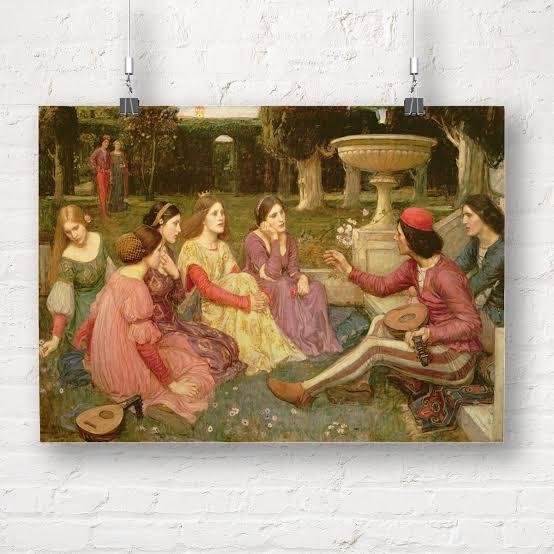𝐂𝐥𝐞𝐯𝐞𝐫 𝐖𝐨𝐫𝐝𝐬, 𝐂𝐥𝐞𝐯𝐞𝐫𝐞𝐫 𝐖𝐨𝐦𝐞𝐧: 𝐅𝐞𝐦𝐚𝐥𝐞 𝐀𝐠𝐞𝐧𝐜𝐲 𝐢𝐧 𝐭𝐡𝐞 𝐓𝐚𝐥𝐞 𝐨𝐟 𝐌𝐚𝐝𝐨𝐧𝐧𝐚 𝐅𝐢𝐥𝐢𝐩𝐩𝐚
Introduction
Giovanni Boccaccio’s The Decameron offers a vivid tapestry of medieval life, often highlighting wit and wisdom over brute authority. One tale that exemplifies this is the story of Madonna Filippa, a woman brought to trial for adultery who uses her eloquence to escape punishment. This tale stands out not just for its humor, but for its surprising advocacy of female agency and intellectual equality in a deeply patriarchal society.
Summary
In the seventh tale of Day Six, Madonna Filippa is caught by her husband with another man and taken to court, where she faces death for adultery under local law. When given a chance to speak, she does not deny the affair. Instead, she argues logically and gracefully: she has never denied her husband what is his, and what she gave to her lover was not needed by her husband. Her clever speech wins over the crowd and even the judge, who changes the law so that only women who cheat for money will be punished.
Analysis
At its core, this tale is a celebration of wit and reason. Madonna Filippa does not cry, beg, or blame others. Instead, she uses logic—framing her actions as harmless because they caused no deprivation to her husband. In doing so, she cleverly challenges the rigid moral codes of her time. Boccaccio presents her argument not just as persuasive but as just, suggesting that true virtue includes intelligence and fairness, not blind adherence to tradition.
Her victory in court also represents a subversive reimagining of gender roles. In a society where women had limited autonomy, Filippa’s eloquence places her on an intellectual pedestal above her male accusers. Boccaccio often uses women in *The Decameron* to highlight wisdom, and Filippa is among the most memorable—her defiance is rational, not rebellious, making her all the more powerful.
The story is also an example of how The Decameron blends comedy and critique. While the situation is humorous, it holds a mirror to the absurdity of societal double standards. The judge's decision to change the law adds to the tale’s idealistic tone, where justice is flexible in the face of human reason.
Personal Response
What struck me most was how modern this tale felt. Madonna Filippa’s confident speech could easily be part of a feminist debate today. Her sense of logic and fairness is relatable, and it’s refreshing to read a medieval text that doesn’t simply punish women for sexuality. I enjoyed the story not only for its humor but also for its message that intelligence should be valued over blind morality.
Conclusion
The tale of Madonna Filippa endures because it blends charm, humor, and a bold commentary on justice and gender. Boccaccio elevates the cleverness of women, and in doing so, gives her not only a voice—but the final word.
Introduction
Giovanni Boccaccio’s The Decameron offers a vivid tapestry of medieval life, often highlighting wit and wisdom over brute authority. One tale that exemplifies this is the story of Madonna Filippa, a woman brought to trial for adultery who uses her eloquence to escape punishment. This tale stands out not just for its humor, but for its surprising advocacy of female agency and intellectual equality in a deeply patriarchal society.
Summary
In the seventh tale of Day Six, Madonna Filippa is caught by her husband with another man and taken to court, where she faces death for adultery under local law. When given a chance to speak, she does not deny the affair. Instead, she argues logically and gracefully: she has never denied her husband what is his, and what she gave to her lover was not needed by her husband. Her clever speech wins over the crowd and even the judge, who changes the law so that only women who cheat for money will be punished.
Analysis
At its core, this tale is a celebration of wit and reason. Madonna Filippa does not cry, beg, or blame others. Instead, she uses logic—framing her actions as harmless because they caused no deprivation to her husband. In doing so, she cleverly challenges the rigid moral codes of her time. Boccaccio presents her argument not just as persuasive but as just, suggesting that true virtue includes intelligence and fairness, not blind adherence to tradition.
Her victory in court also represents a subversive reimagining of gender roles. In a society where women had limited autonomy, Filippa’s eloquence places her on an intellectual pedestal above her male accusers. Boccaccio often uses women in *The Decameron* to highlight wisdom, and Filippa is among the most memorable—her defiance is rational, not rebellious, making her all the more powerful.
The story is also an example of how The Decameron blends comedy and critique. While the situation is humorous, it holds a mirror to the absurdity of societal double standards. The judge's decision to change the law adds to the tale’s idealistic tone, where justice is flexible in the face of human reason.
Personal Response
What struck me most was how modern this tale felt. Madonna Filippa’s confident speech could easily be part of a feminist debate today. Her sense of logic and fairness is relatable, and it’s refreshing to read a medieval text that doesn’t simply punish women for sexuality. I enjoyed the story not only for its humor but also for its message that intelligence should be valued over blind morality.
Conclusion
The tale of Madonna Filippa endures because it blends charm, humor, and a bold commentary on justice and gender. Boccaccio elevates the cleverness of women, and in doing so, gives her not only a voice—but the final word.
𝐂𝐥𝐞𝐯𝐞𝐫 𝐖𝐨𝐫𝐝𝐬, 𝐂𝐥𝐞𝐯𝐞𝐫𝐞𝐫 𝐖𝐨𝐦𝐞𝐧: 𝐅𝐞𝐦𝐚𝐥𝐞 𝐀𝐠𝐞𝐧𝐜𝐲 𝐢𝐧 𝐭𝐡𝐞 𝐓𝐚𝐥𝐞 𝐨𝐟 𝐌𝐚𝐝𝐨𝐧𝐧𝐚 𝐅𝐢𝐥𝐢𝐩𝐩𝐚
Introduction
Giovanni Boccaccio’s The Decameron offers a vivid tapestry of medieval life, often highlighting wit and wisdom over brute authority. One tale that exemplifies this is the story of Madonna Filippa, a woman brought to trial for adultery who uses her eloquence to escape punishment. This tale stands out not just for its humor, but for its surprising advocacy of female agency and intellectual equality in a deeply patriarchal society.
Summary
In the seventh tale of Day Six, Madonna Filippa is caught by her husband with another man and taken to court, where she faces death for adultery under local law. When given a chance to speak, she does not deny the affair. Instead, she argues logically and gracefully: she has never denied her husband what is his, and what she gave to her lover was not needed by her husband. Her clever speech wins over the crowd and even the judge, who changes the law so that only women who cheat for money will be punished.
Analysis
At its core, this tale is a celebration of wit and reason. Madonna Filippa does not cry, beg, or blame others. Instead, she uses logic—framing her actions as harmless because they caused no deprivation to her husband. In doing so, she cleverly challenges the rigid moral codes of her time. Boccaccio presents her argument not just as persuasive but as just, suggesting that true virtue includes intelligence and fairness, not blind adherence to tradition.
Her victory in court also represents a subversive reimagining of gender roles. In a society where women had limited autonomy, Filippa’s eloquence places her on an intellectual pedestal above her male accusers. Boccaccio often uses women in *The Decameron* to highlight wisdom, and Filippa is among the most memorable—her defiance is rational, not rebellious, making her all the more powerful.
The story is also an example of how The Decameron blends comedy and critique. While the situation is humorous, it holds a mirror to the absurdity of societal double standards. The judge's decision to change the law adds to the tale’s idealistic tone, where justice is flexible in the face of human reason.
Personal Response
What struck me most was how modern this tale felt. Madonna Filippa’s confident speech could easily be part of a feminist debate today. Her sense of logic and fairness is relatable, and it’s refreshing to read a medieval text that doesn’t simply punish women for sexuality. I enjoyed the story not only for its humor but also for its message that intelligence should be valued over blind morality.
Conclusion
The tale of Madonna Filippa endures because it blends charm, humor, and a bold commentary on justice and gender. Boccaccio elevates the cleverness of women, and in doing so, gives her not only a voice—but the final word.
0 Kommentare
·1 Anteile
·143 Ansichten
·0 Vorschau





